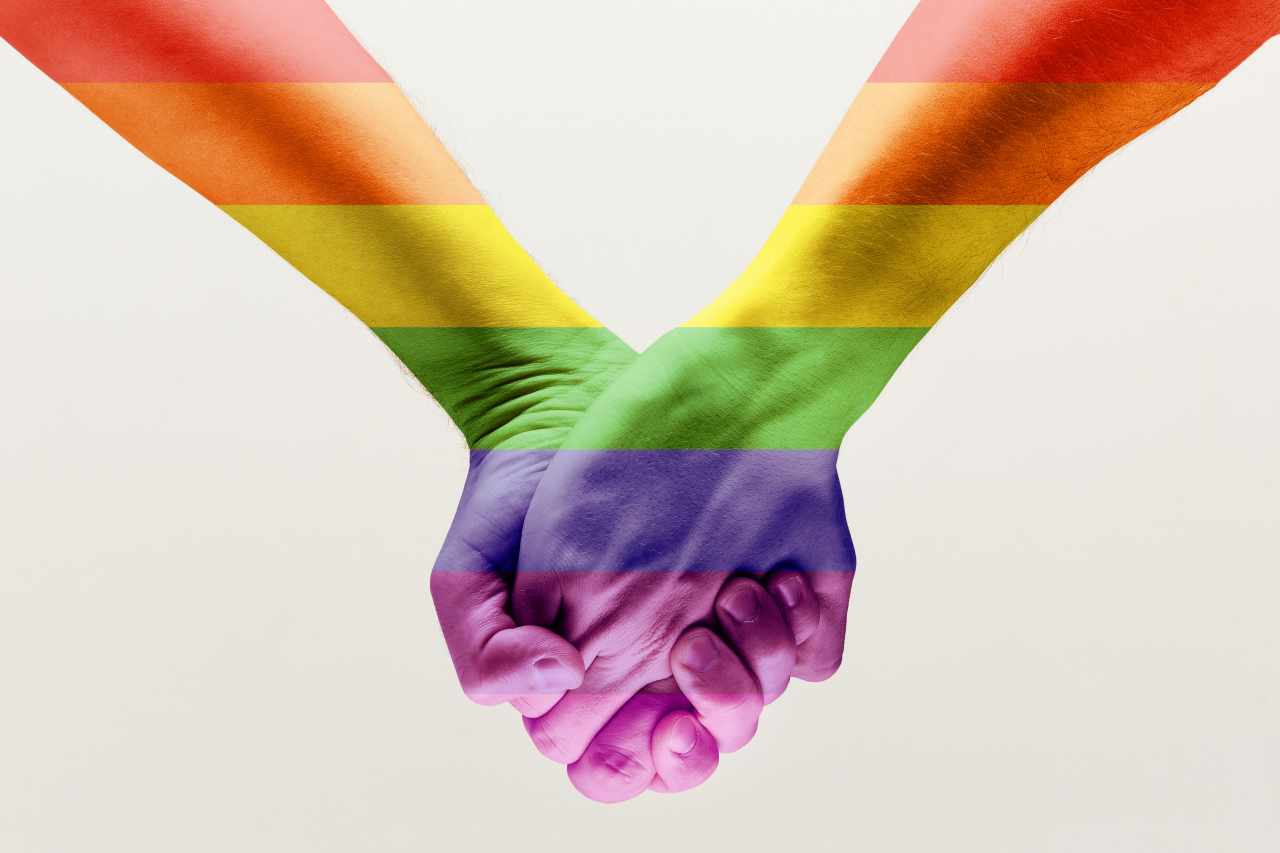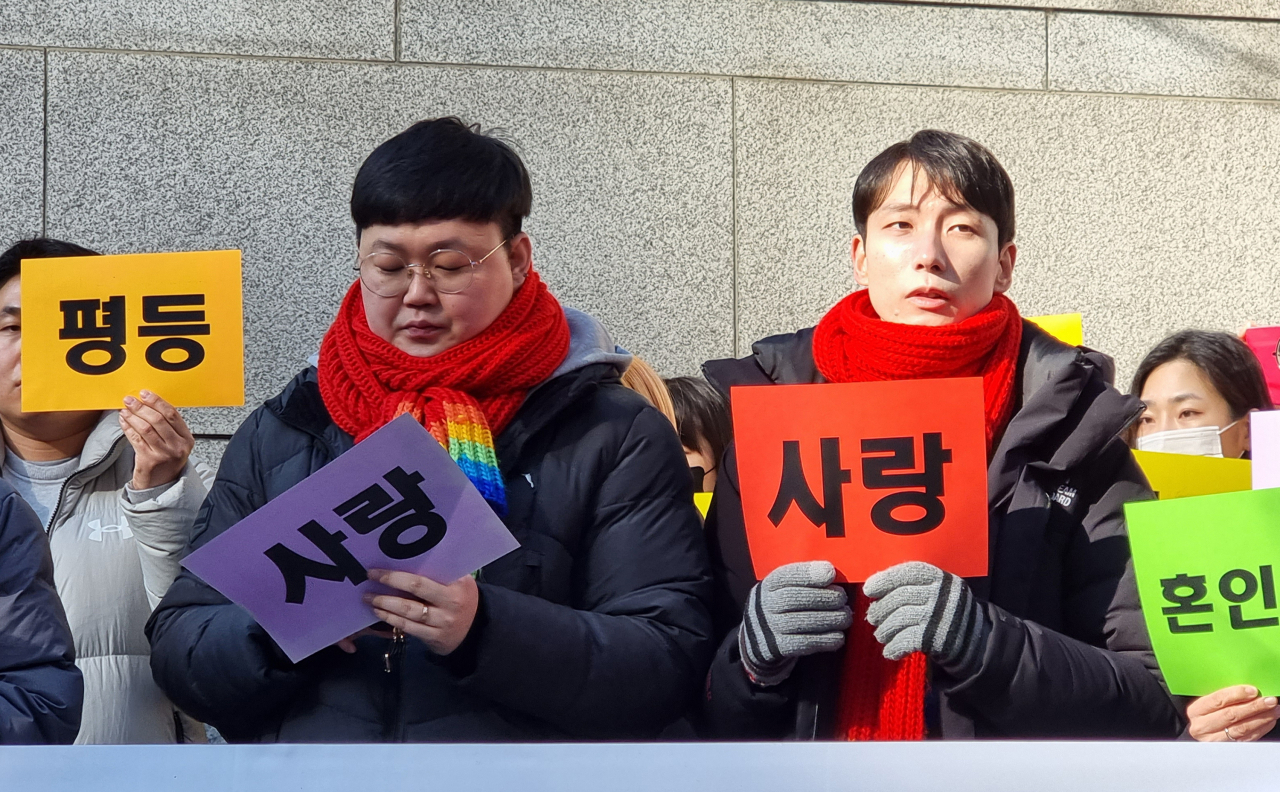Where does Korea stand on same-sex marriage?
Landmark ruling in February bolstered hopes of expansion of legal rights for gay couples, but hurdles remain
By Yoon Min-sikPublished : March 20, 2023 - 16:52
A ruling last month by a high court in Seoul has resurrected the debate on same-sex marriages, which, unlike in many other countries, is a topic rarely-discussed in South Korea.
The judgement acknowledged people in same-sex partnerships as eligible dependents for national health insurance coverage under a partner’s subscription, a decision which was hailed by sexual minorities and their advocates, and denounced by naysayers, including conservative Christian groups.
“Common-law marriages and same-sex partnerships are essentially the same in that they build an emotional and economic union through living together. Excluding same-sex partners from coverage while including common-law spouses is therefore a violation of the principle of equality,” the court said on Feb. 21.
The court stated, however, that the partnership of the couple -- So Sung-uk and Kim Yong-min -- would not be legally recognized as a common-law marriage under the current Korean legal system.
While the ruling marked a step forward in the legal protection of people in same-sex partnerships, especially in terms of social safety nets, it is unclear how far it will progress the overall debate on same-sex unions, or if it the movement as a whole can maintain its momentum.
The ruling has already been challenged by Korea's National Health Insurance Service, which filed an appeal on March 6.

Korea on same-sex marriage
While South Korea’s Constitution does not mention same-sex marriage by name, Article 36 states that marriage and family shall be established and sustained on the “basis of individual dignity and equality of both genders.” This has traditionally been interpreted as meaning that a marriage should involve opposite genders.
Although homosexuality itself is seen as falling within the scope of the constitutional right to pursue one's happiness in the Korean legal system, homosexual marriage is not, says Lee Jong-geun, president of Kyungsung University, formerly a professor of law at Donga University.
“There are arguments (in Korea) that a new concept of marriage is necessary as Article 36 of the Constitution (on marriage) is unable to cover new types of families in our society, such as same-sex marriages and single parent households,” he writes in “Constitutional Issues Surrounding Same Sex Marriage” published by the Constitutional Court of Korea.
The history of the dispute concerning the legal status of same-sex couples in Korea dates back to 2004, when a gay couple requested a division of assets, having separated after 20 years of being together. Despite the couple claiming to be in a state of de facto marriage, a concept similar to common-law marriage which recognizes the same legal rights as a spouse, the court ruled that a partnership between two people of same gender cannot be considered the same as a de facto marriage.
A decade later, film director Kim-Jho Gwang-soo made headlines with his ultimately unsuccessful two-year long battle to register his homosexual partnership as a common-law marriage.
Although the South Korean government does not process the marriage registration application of same-sex couples, Supreme Court data shows that 28 homosexual couples applied to register their marriages from March of 2022 to February of this year.

Acknowledging the limits of the current legal system, the National Human Rights Commission in April 2022 made a recommendation to the parliamentary speaker to revise the law to accommodate the changing form of families, including those comprised of sexual minorities.
Legislative initiatives
There have been some legislative initiatives aimed at granting legal rights to gay couples. One such effort was known as the “Life Companion Bill,” a proposal envisioned by Rep. Jin Sun-mi of the main opposition Democratic Party. The bill never made it to the legislative stage in the face of strong opposition from some religious and conservative groups which claimed it would effectively “legalize homosexuality” by failing to specify a companionship should be between differing genders.
These same groups are in vocal opposition of the February ruling.
The United Christian Churches of Korea, the largest umbrella union of Christian churches in the country, called the decision that acknowledged same-sex unions for national health insurance coverage “biased.”
“(The ruling) boils down to whether our (Korean) society will legally recognize same-sex couples,” the UCCK said in a statement, stressing that a union between two people of same gender is fundamentally different to that between different genders, and that treating the two concepts differently does not violate the principle of equality. It went on to say that the legalization of same-sex marriage is a matter that requires a national consensus and not something that the judiciary “should lead ahead of the public, but wait and listen to (public opinion).”
Their assertion stems from the recognition that there is insufficient national support for the legalization of same-sex marriage.
According to a Gallup International survey on individuals aged 19-79 in 63 countries across the world, 55 percent of South Korean respondents were opposed to same-sex marriage, compared to the global average of 44 percent.
In the results of another survey, this time commissioned by the Korean Ministry of Culture, Sports and Tourism, close to 80 percent of the 5,100 adults surveyed said “no” to a question about whether Korea should legalize same-sex marriages. Those who answered “yes” stood at 21.1 percent.
Despite the concept of homosexual unions not being widely supported here, some legislators and legal experts stress that same-sex couples do live among Koreans today and that fact needs to be reflected in the current legal system.
“The current law customarily recognizes legal marriages and de facto marriages. At the very least there must be legal grounds to include same-sex marriages in the concept of de facto marriages,” professor Han Sang-hie of Konkuk University Law School said in a forum that was organized by Rep. Jang Hye-young of the minor opposition Justice Party, held at the National Assembly earlier this month.

The Justice Party is currently pushing for the enactment of bills on the life companionship, the legalization of same-sex marriages and on supporting births outside of marriage. The path for the enactment of such bills will likely be an uphill battle.
“In order (for the sexual minorities) to have the same rights (in marriage), the existing, heterosexual-oriented marriage system must be revamped so that everyone has the right and freedom to marry anyone -- regardless of the other person’s gender,” said lawyer Park Han-hee, the legal representative of the So-Kim couple, during the forum.
The So-Kim couple stressed that it was the National Assembly’s duty to protect minorities.
“It took two years for us to acquire just one right, and it may take a couple of more years since the NHIS appealed the case. It may take us thousands of years to get the rest of our rights,” they said, urging support from lawmakers.
caption- So Sung-uk (left) and Kim Yong-min hold a press conference in front of the Seoul High Court in Seoul on Feb. 21 after the court ruled in their favor. (Yonhap)



















![[Today’s K-pop] Treasure to publish magazine for debut anniversary](http://res.heraldm.com/phpwas/restmb_idxmake.php?idx=642&simg=/content/image/2024/07/26/20240726050551_0.jpg&u=)